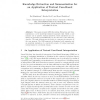Free Online Productivity Tools
i2Speak
i2Symbol
i2OCR
iTex2Img
iWeb2Print
iWeb2Shot
i2Type
iPdf2Split
iPdf2Merge
i2Bopomofo
i2Arabic
i2Style
i2Image
i2PDF
iLatex2Rtf
Sci2ools
124
click to vote
ICCBR
2007
Springer
2007
Springer
Knowledge Extraction and Summarization for an Application of Textual Case-Based Interpretation
Abstract. This paper presents KES (Knowledge Extraction and Summarization), a new knowledge-enhanced approach that builds a case memory out of episodic textual narratives. These narratives are considered as generated probabilistically by the structure of the task they describe. The task elements are then used to construct the structure of the case memory. The KES approach is illustrated with examples and an empirical evaluation of a real-world scenario of textual case-based interpretation for a technical domain. 1 An Application of Textual Case-Based Interpretation Janet Kolodner has described interpretive Case-Based Reasoning (CBR) as “a process of evaluating situations or solutions in the context of previous experience” [11, p. 86]. She argues that this evaluation can be performed by means of comparing and contrasting a new situation to old experiences. A defining aspect of interpretive CBR is the fact that a reasoner cannot be content with the recall of only one previous situat...
| Added | 08 Jun 2010 |
| Updated | 08 Jun 2010 |
| Type | Conference |
| Year | 2007 |
| Where | ICCBR |
| Authors | Eni Mustafaraj, Martin Hoof, Bernd Freisleben |
Comments (0)

